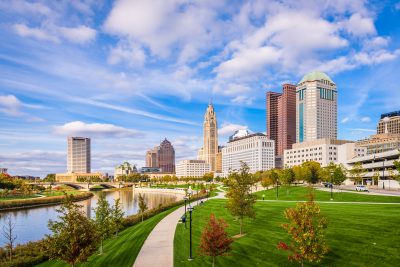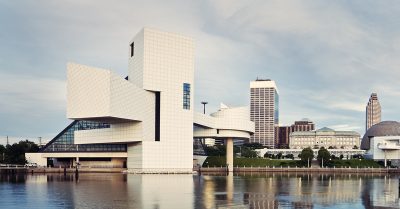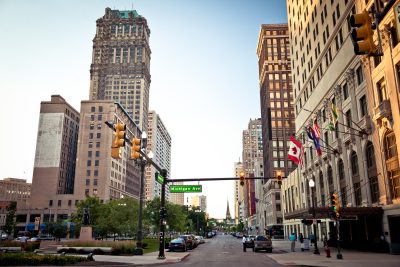Global Competitiveness
The United States has long been the destination for the world’s most talented immigrants. Despite the last 50 years of technological advancement, American immigration policy has remained virtually unchanged, putting in danger America's global competitiveness. Yesterday's immigration policy no longer meets today’s economic needs. Only about 14 percent of all U.S. green cards are given for economic reasons, compared to more than 60 percent in Canada and Australia. With no dedicated visa for entrepreneurs and numerous barriers to residency in place for international students to stay after graduation, America's outdated immigration policy could allow other countries to out-compete us by attracting and keeping the best and brightest there and not here.

Costa Rican Immigrant Community Organizer Supports Vulnerable Communities in Mercer County
Laura MoraCommunity Organizer, Latin American Legal Defense and Education Fund Laura Mora grew up in a poor Costa Rican farming community, where her father worked in the tobacco fields to support his 10 children. Today, she is a Community Organizer and Client Advocate who supports the vulnerable population and… Read More

Taiwanese Immigrant Engineer Turned Mayor in West Windsor
Shing-Fu HsuehFormer Mayor of West Windsor Shing-Fu Hsueh (pronounced “Shay”) came to New Jersey from Taiwan in 1969 with $300 in his pocket and a heavy accent that required help from a speech therapist. Despite these challenges, he went on to become a successful environmental engineer, professor, and a… Read More

New Report Shows Immigrants in Mercer County Paid Over $1.3 Billion in Taxes and Held $2.8 Billion in Spending Power in 2019
MERCER COUNTY, NJ – A new report released today by New American Economy (NAE), in partnership with the New Jersey Business Immigration Coalition, the Princeton Mercer Regional Chamber of Commerce, and Mercer County, underscores the critical role immigrants… Read More

Iranian Student Turned Healthcare CEO Helps Hundreds Fight COVID-19 in Mercer County
Al MaghazehePresident & CEO, Capital Health Al Maghazehe came to the United States as an international student in 1977, but when the Iranian Revolution broke out a year later, he realized he couldn’t safely return home. Raised in a tight-knit family, Maghazehe struggled with loneliness at first, but finished… Read More

New Report Shows Immigrants and Refugees in the Minneapolis Area Paid Over $443 Million in Taxes and Held $1.2 Billion in Spending Power in 2019
Immigrants and refugees in the Minneapolis area make up 13.2 percent of business owners and 13.4 percent of STEM workers MINNEAPOLIS, MN – A new report released today by New American Economy (NAE), in partnership with the Minneapolis Regional Chamber of Commerce and the… Read More

Statement from NAE Executive Director Jeremy Robbins
Creating a path to citizenship for Dreamers and TPS holders is a critical piece of the effort to reform America’s outdated immigration system. It is past time for the uncertainty that has plagued Dreamers, TPS holders, their employers, and the communities they call home to end, and we support bipartisan… Read More

Statement from New American Economy Following the Introduction of the Equal Access to Green Cards for Legal Employment (EAGLE) Act
Upon introduction of the Equal Access to Green Cards for Legal Employment (EAGLE) Act in the House, New American Economy issues the following statement: “New American Economy applauds the introduction of the Equal Access to Green cards for Legal Employment (EAGLE) Act this week in the House of Representatives,” said… Read More

New Report Shows Immigrants in Central Ohio Paid More than $2 Billion in Taxes in 2019
Immigrants in the Columbus region accounted for 26.4 percent of the population growth between 2014 and 2019. COLUMBUS, OH – Immigrants paid more than $2.1 Billion in taxes in central Ohio in 2019, according to new research from New American Economy (NAE) through the Gateways for Growth program, operated… Read More

Crain’s Cleveland Business: Ohio business leaders will push for place-based immigration in 2021
The push for more immigration targeted to specific regional areas as a means to replace declining population while growing the workforce is one of the main focuses for Ohio Business for Immigration Solutions and other organizations. As Ohio’s 134th General Assembly and the 117th Congress prepare toconvene new legislative… Read More

Detroit Uses New Research to Inform Immigrant-inclusive COVID-19 Relief Measures
New Research from New American Economy shows that immigrants in Detroit play an outsize role in critical industries like Healthcare, Pharmacies, Groceries and Restaurants. Detroit, MI– New research from New American Economy (NAE) released today in partnership with the City of Detroit, Detroit Regional Chamber, Global Detroit, Oakland County,… Read More
Impending Labor Challenges
The United States is facing demographic challenges that endanger its preeminent economic position in the world. An aging workforce threatens the vitality of the labor force. At the same time, the supply of U.S.-trained engineers is lagging behind nearly all other industrialized economies. At a time when tech-heavy and innovation driven industries are driving economic growth, the United States faces the prospect of being left behind.
Table 1: Share of Population Age 65+, 1996, 2006, 2016 and projected 2030
Table 2: Share of Undergrads Studying Engineering
Prioritizing Economic Needs
Many countries have identified the link between immigration and economic growth. For many, such moves are a matter of necessity–the domestic labor force is not sufficient for an expanding economy, and aging populations and declining fertility rates are creating labor shortages. Despite facing some of the same challenges, U.S. immigration policy has not changed to reflect our economy’s evolving needs.
Table 3: Percentage of All Permanent Residency Visas Given for Economic Reasons*
Need for a Start-Up Visa
Countries around the world, from France, to Chile, to Singapore have created visas aimed at attracting promising entrepreneurs and job creators. Despite concerns about meager job creation and business growth, however, the United States has not taken a similar step, endangering our position in the global race for talent. This situation was made worse in 2017 when the administration took the first steps to kill the International Entrepreneur Rule, a measure that would have allowed entrepreneurs with outside funding to remain in the country for 2.5 years to establish their businesses.
Make a contribution
Make a direct impact on the lives of immigrants.
